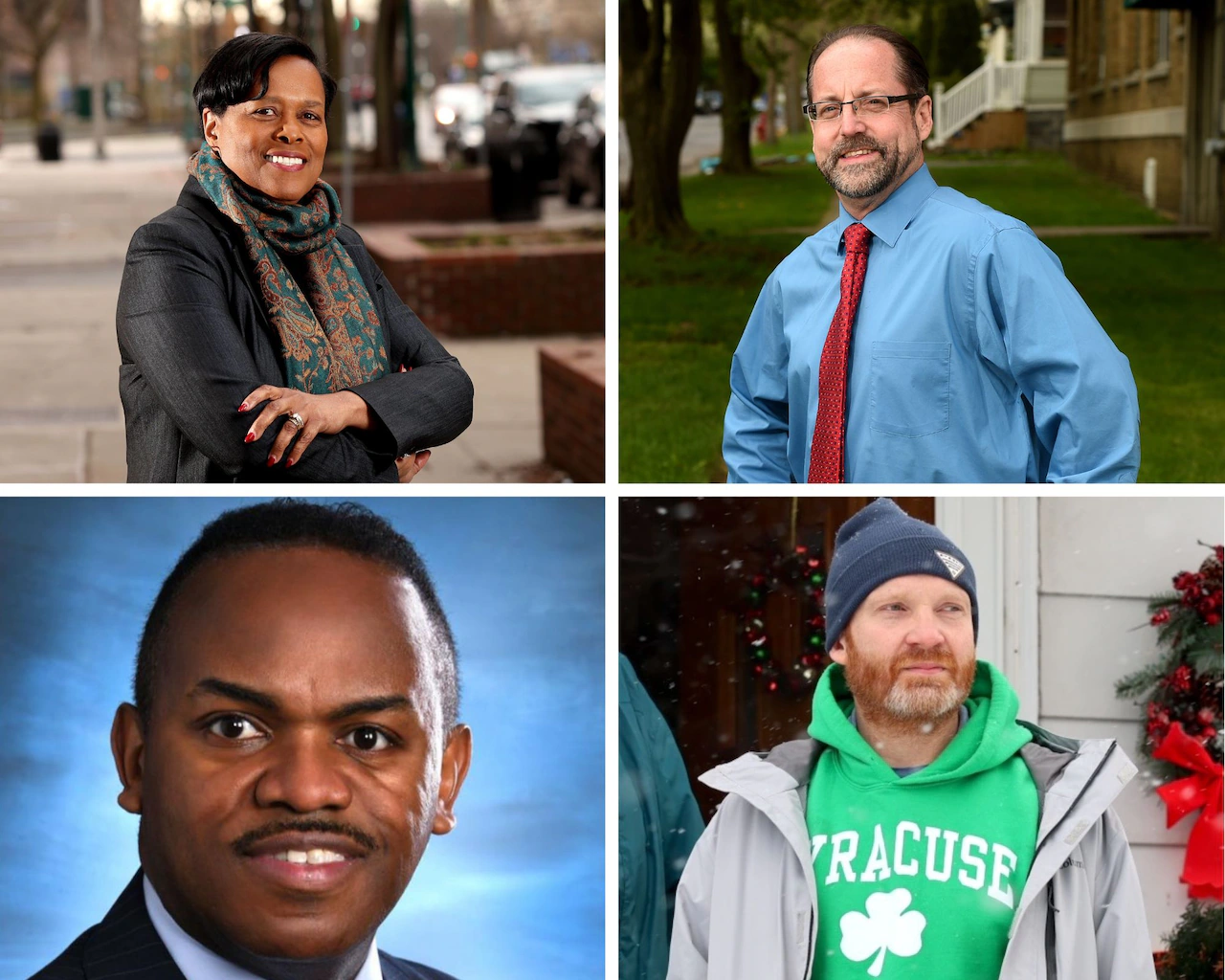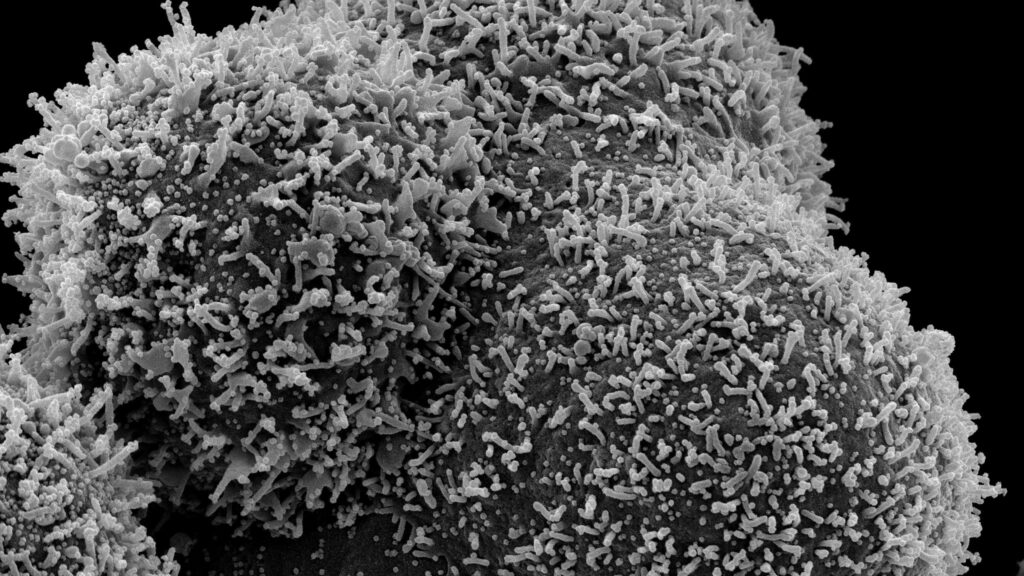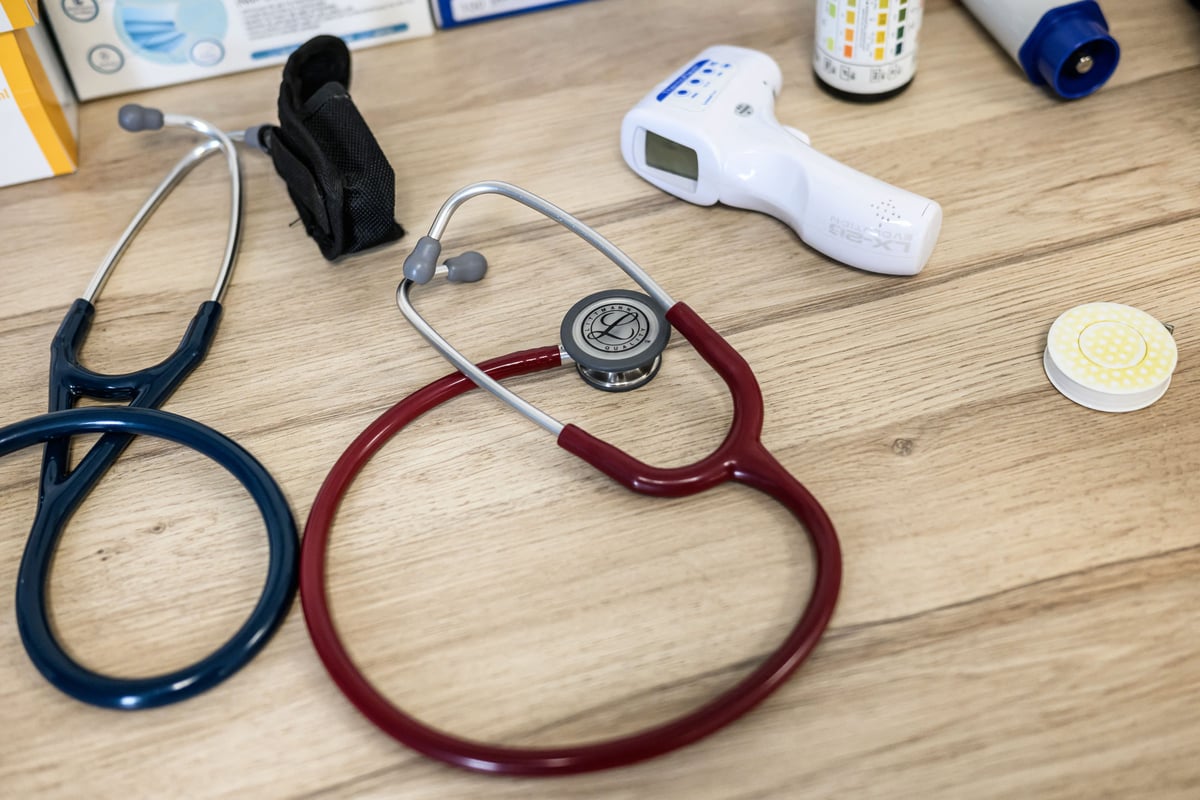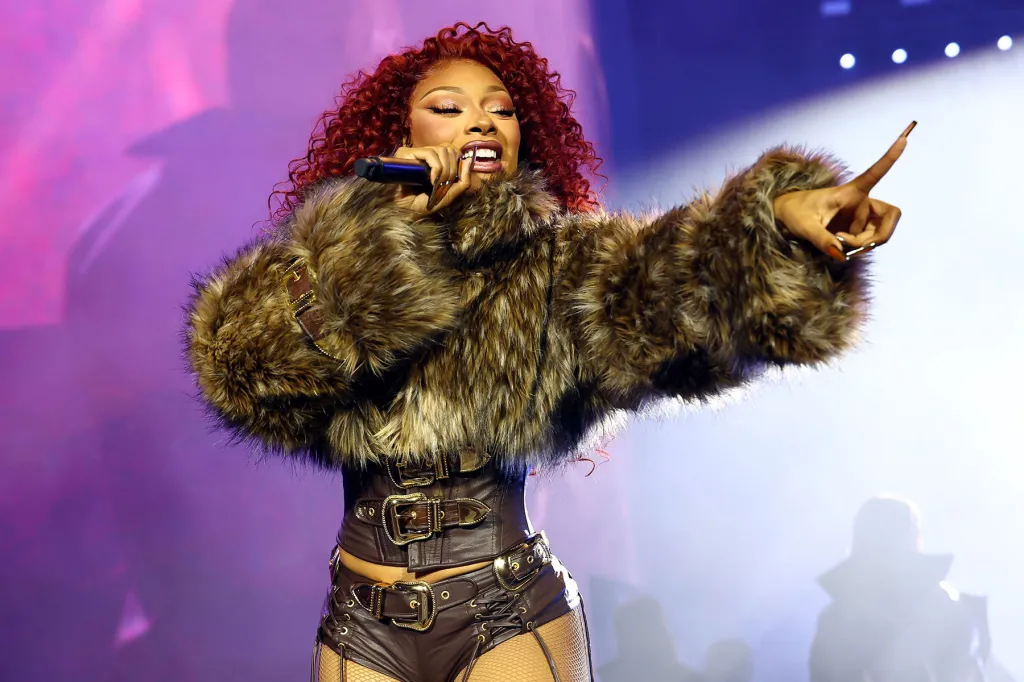Copyright syracuse.com

Syracuse, N.Y. — The ballot in this year’s Syracuse mayoral election offers voters four unique choices. No one who has been paying attention to this year’s race can reasonably argue that Democrat Sharon Owens, Republican Thomas Babilon and independents Alfonso Davis and Tim Rudd bring similar backgrounds or offer the same policy positions. For the past eight weeks, we’ve asked and the candidates have answered questions about city issues and leadership. The series has shown voters some clear differences. But what about their vision for the city they hope to lead? In an effort to get at the answer to that question, we asked each candidate to talk about why they are running, what city strengths they would build on and how Syracuse would look different after the first four years of their administration. Their answers, published by candidate in the order they appear on the ballot, appear below. The next mayor will manage a city government with about 2,100 employees on the payroll and a budget of $333 million. The new mayor will be in charge as the Interstate 81 viaduct cutting through the city’s center comes down and the Micron semiconductor plant gets built in the northern suburbs, both widely viewed as transformational opportunities for the region. It’s particularly important in Syracuse, which continues to have one of the highest child poverty rates in the nation. Early voting starts on Saturday, Oct. 25, and runs through Sunday, Nov. 2. Election Day is Tuesday, Nov. 4. For details on where to vote and polling hours, visit the Onondaga County Board of Elections website or call (315) 435-8683. Sharon Owens Age: 62 Neighborhood where you reside: Meadowbrook Family: Married with two adult children Education: Bachelor’s degree from Syracuse University (economics) Professional and political experience: Over three decades of work in community service: nonprofit leadership (including roles at Dunbar Center, PEACE Inc., Jubilee Homes, Home Headquarters), managing early childhood/family support programs; deputy commissioner of neighborhood and business development; CEO of the Syracuse Model Neighborhood Facility; and now deputy mayor overseeing housing, neighborhood, and business development, emergency services and public safety, sustainability planning, etc. Why are you running for mayor? I am running for mayor because I believe Syracuse stands at a once-in-a-generation moment — one we must maximize, which is the slogan in which I’ve rooted my campaign. In my years serving neighborhoods, leading nonprofits, and managing city initiatives, I’ve seen firsthand the potential in every individual in every community, and I’ve seen what happens when systems fail people. I’ve been the person planting seeds in neighborhoods, the person working with government, business and community partners and advocates to build housing, improve safety, and expand access to good jobs. Now, I believe we’re ready to scale that work, and that I’m the person who can lead the way. My campaign is about putting our people first. My leadership style begins with listening to ensure that I deliver for all residents. I believe that our city’s growth, from infrastructure investments like Micron, to I-81 transformation, to housing, must be matched by growth in opportunity, equity and life quality for all people. I’ve earned trust serving in leadership in both the nonprofit sector and city government. My experience gives me the tools to build on success, fix what hasn’t worked, and create a Syracuse where no matter your zip code, you have access to safety, housing, basic services and a voice in decisions that affect your life. I’m running so that this moment doesn’t pass us by and that we seize it together. What is Syracuse’s biggest strength and how will you build on it? Syracuse’s greatest strength is its people. Our people are resilient, creative and committed. From volunteers in neighborhood groups, to small business owners, to families raising children, there is an abundance of caring, resourceful, determined people who want this city to thrive. We also have anchor institutions — universities, nonprofits, faith communities — and a growing wave of both public and private investment (infrastructure, Micron, I-81 transformation) that has the power to reshape our future. To build on this strength, I will ensure that these revitalization efforts are matched with community investments in diverse and affordable housing; job pathways with real local hiring; public safety rooted in trust and prevention; improved transit so people can access opportunity; and environmental health, including dealing with lead, and other toxins, and ensuring equitable green space. I will convene community partners to co-design solutions rather than impose them. When people feel they are a part of the process, outcomes are stronger. I will also prioritize transparency and accountability so the citizens know how decisions are made, funds are spent, and outcomes measured. With that, Syracuse can be a model for cities experiencing growth. My vision for this city lifts every neighborhood, and every voice. How will Syracuse be different after four years if you become mayor? In four years, we’ll have maximized this moment. Syracuse will have population and structural growth and will feel more equitable, inclusive, connected, accountable, and less impoverished. My platform prioritizes thriving neighborhoods, public safety, young people, an inclusive and growing economy, financial sustainability and future planning. There will be more housing reflecting diverse needs; investment in our parks and public spaces, including options for tweens/teens; strengthened law enforcement and fire safety; collective prosperity. Public safety will be strengthened by more officers, community engagement and prevention resources, and by redefining response to non-violent crimes. Services for people with special needs, after-school programs, for those just getting by will be more accessible and better coordinated. Transit and infrastructure will reflect a city growing with intention — Syracuse will be walkable/bikeable, still sharing space with motor vehicles. It will include: road and sidewalk creation/repair, expanded public transportation with Bus Rapid Transit and routes to new jobs; coordination around climate resilience. We’ll see progress around jobs: reduced unemployment, stronger workforce development/apprenticeships, and improved hiring practices within city government providing opportunities for family-sustaining wages/benefits. Trust in city government will be higher because I will lead in the way which I live my life: with accountability, open communication, listening sessions, transparent budgeting. I’ll ensure all voices, especially from historically marginalized neighborhoods, are heard and respected. Syracuse will have harnessed its potential to be a place where people want to live, work and play — a city where opportunity is real, growth is shared, and community is at the center. Thomas Babilon Age: 54 Neighborhood where you reside: Hawley Green Family: Engaged with a daughter, 20, step-children ages 15 and 17 and a baby daughter expected Dec. 16. Education: Bachelor’s degree from University of Central Florida (political science), University of Florida Juris Doctor (with honors) Professional and political experience: Political experience — 2025 candidate for mayor of the city of Syracuse, 2021 candidate for mayor of the city of Syracuse, 2019 candidate for Syracuse Common Council (at large). Professional experience — Hiscock Legal Aid Society, senior attorney, August 2018-present: I have represented income-qualified clients in family court matters. I originally appeared with clients in Onondaga County Family Court but since 2023 I have exclusively practiced in family court appeals; City of Syracuse Department of Law, assistant corporation counsel, September 2008-July 2018: I was hired in 2008 by Mayor Driscoll to assist with the housing division. I ran that division for two years and was instrumental in making key changes which substantially increased its efficiency in prosecuting code and zoning violations. Mayor Stephanie Miner and Director of Neighborhood and Business Development Paul Driscoll then asked me to be the attorney advisor for the Department of Neighborhood and Business Development. In that capacity I met frequently with the director and deputy directors, I negotiated all federal and state housing grant agreements and was responsible for drafting and closing all recipient grant agreements. During this time, I represented the city’s public benefit corporations including SIDA, SEDCO, SURA and the land bank. I assisted in the lobbying efforts that resulted in the state legislation that permitted the creation of the land bank and negotiated and drafted the intergovernmental agreement and local ordinance that created the land bank. I served as its attorney for its first year and drafted all of its initial by-laws and operating procedures. During this time, I personally advised the mayor, common councilors, and all board members of public benefit corporations. Mayor Miner and the head of Personnel Robert Stamey then asked me to advise and represent that department. In that capacity I advised the mayor and every department head on labor and employment issues. I was part of the mayor’s negotiation team and negotiated new contracts for all bargaining units. I was also responsible for negotiating discipline with each bargaining unit and prosecuting any employee discipline that reached the level of arbitration. Prior to working for the city, I was in private practice. I primarily practiced in the areas of criminal defense, family law, real estate, landlord / tenant, and civil law. I was an active member of the assigned counsel panel and many of my clients were assigned to me pursuant to that program. After law school and prior to moving to New York I practiced for a short period of time as a certified legal intern at the Osceola County Office of the Public Defender in Kissimmee, Florida. Why are you running for mayor? I am running for mayor because I want to help people. I have dedicated my legal career to helping people and I would like to make Syracuse a better place for all of us. As a city employee, I often saw it treat people badly, it frequently harmed residents, homeowners, small business owners and its own employees. People were disproportionately treated based on their level of political connectedness. The city still operates in this manner, and it must change. Every tax hike of this administration has harmed our residents. It has made housing less affordable amid a housing crisis; and has fueled generational poverty by stealing the equity of homeowners in our impoverished city. The administration’s antagonistic approach to small business has hampered entrepreneurialism, job creation, and sales and property tax revenues. Businesses have made decisions to operate outside of the city, or close. While small businesses suffered, politically connected corporations benefitted from huge tax breaks that had little community benefit. Public safety has been ignored for eight years. We have a record low number of officers, and the department has had difficulty recruiting under this anti-police administration. Our residents feel less safe, and our police officers feel less appreciated. People leave the city when conditions become intolerable to them. We lost 1.3% of our population in the last four years. We were the only municipality in the county to decline in population. To reverse this trend, we need to stop harming people and instead develop policy to help them. What is Syracuse’s biggest strength and how will you build on it? Syracuse’s biggest strength is its central location, and its connectivity by air, rail and highway to the rest of the state. Its location and connectivity are an enormous business asset that has been widely underappreciated and not properly marketed. For too long the city’s office of business development has been engaged in giving tax incentives to those projects that likely would have been built anyway, that offer little benefit to the overall community and whose developers share a cozy relationship with the mayor’s office. This concept is perfectly illustrated by the multiple luxury student housing projects that have recently arisen between East Genesee Street and East Fayette Street. These projects offer rental units that are far above market rate, and which would have been constructed regardless of the city’s millions in tax incentives. I will create a professional department of business development, where projects will be judged on their benefit to the community. We will hire a professional department head with experience in recruiting corporations that are looking to expand or relocate. We will capitalize on our central location and transportation infrastructure to entice new businesses to relocate here. We will prioritize tax incentives for job and wealth creation. Projects will be judged solely on their merits. How will Syracuse be different after four years if you become mayor? Our police department will be fully staffed, funded and will have the support of the mayor. Joint task force units will be re-created. Neighborhood policing will create reoccurring interaction between the same officers and members of the community. More cops will be put on the streets by eliminating desk jobs. Auxiliary police will respond to some non-priority calls that now go unanswered. Our police will no longer be handcuffed, and we will feel safe again in our own neighborhoods. We will have a vibrant downtown where people want to live, work, and play. Aggressive panhandlers, the mentally ill, and those camping on city sidewalks will be removed and directed towards services. Housing options will be increased as we work towards eliminating homelessness through creative solutions like micro apartments, tiny homes, and shared living spaces. The zoning ordinances will be amended to allow for these changes. Syracuse will become the friendliest city in NY to small business. We will eliminate every business fee, license and regulation that that is burdensome, unnecessary or duplicative. City Hall will no longer bully businesses over petty things. There will be full transparency regarding city expenditures and contracts. Monies due to the city will be collected. Wasteful spending will be eliminated. We will reduce costs through the consolidation of services. We will negotiate a merger of the city’s water department with the county water authority. The county will run our payroll services. We will partner with the county, and private entities to reduce costs wherever possible. Tim Rudd Age: 43 Neighborhood where you reside: Elmwood/South Side Family: Married with five children: 22, 17, 13, 6 and 5. Education: Bachelor’s degree from Syracuse University (political science), Master’s degree from Syracuse University (state and local finance), Henninger High School. Professional and political experience: Syracuse city councilor at-large 2018-2020; Syracuse Mayor’s Office of Management and Budget 2020-2025. Additional resume at campaign website. Why are you running for mayor? Ben Walsh is generally understood to be a disappointment. I run because I can do better. His loyal Deputy Mayor, Sharon Owens, is the favorite to take over. I run because I can do better. I have the perspective, professional experience, and grit, to do better. We as a city need to do better. Violence, crime, poverty and sadness are normalized here. But none of that is normal. The status quo here is unacceptable. The first step to changing these conditions is to acknowledge them. Nothing will change if we elect someone who has done all they can but failed to improve the conditions. Worst of all, Sharon Owens thinks the Walsh team is doing a good job! She thinks they are doing a good job because she has been developed by the status quo to manage the status quo. That is her vision of the job. Well, the status quo here sucks. We can do better. We must demand transparency and accountability. I am willing and capable of changing these structures to serve us better. Simply put, I run to offer our community a choice for change. I ask for your thoughtful consideration and your vote. What is Syracuse’s biggest strength and how will you build on it? You are asking this in 2025, which is drastically different than 2007 or even 2017. Back then, I’d have said, short commutes, clean water, abundance of greenspace, celebration of heritage, strong neighborhoods where kids can walk outside, rec sports, shopping centers, winter culture, and community grit. But in 2025, it’s evident those things were taken for granted and are suddenly major topics of debate. The reality is that much of what made Syracuse strong has deteriorated due to poor leadership. We enjoyed being the snowiest city in America and snow days were special. Now snow days are just one more day kids don’t show up and nobody learns. Winter for many residents in Syracuse means cold homes. Traffic is worse than ever. Family values have changed as drug use is more common. The city once with the cleanest water in America is being compared to Flint, Michigan. The second largest mall in America is facing bankruptcy. Our streets aren’t plowed, our trash isn’t picked up, our rec programs have disappeared and our youth test scores are among the worst in the nation. To top it off, our leadership blatantly lies to residents and makes excuses for mistakes that cost residents millions of dollars that could have been put to good use. So it’s much harder to tell you what our strengths are in 2025 and have people believe it. That said, our core strength has been and always will be our grit; our resolve and will to carry on. How will Syracuse be different after four years if you become mayor? 250 words is not enough to describe what would be different, because the city needs a major overhaul. But in a nutshell, Syracuse will actually be safer, as opposed to Sharon Owens touting misleading crime statistics. Police and fire will have the proper investments and the job of law enforcement will be held in higher regard among community members. Our first responder teams will be larger with greater reach across every neighborhood in order to properly protect and serve. A new Eastside fire station (Engine 44) will be under construction paid for by Syracuse University. I will leverage my budgeting expertise and rapport with the common council to make it a reality. Useless, redundant or disingenuous roles within City Hall (e.g. PR, deputy mayor, various chiefs) will be eliminated to directly free up funds to put towards the safety and development of this community. This includes unprecedented opportunities and activities for kids to keep them engaged and focused on a healthy lifestyle, away from drugs and violence. We simply do not have enough opportunities for them currently and in four years this city will feel alive again with new engagement, energy, enthusiasm from our youth. I am just one person that has worked daily over the last seven years to make Elmwood Park and my block on the south side beautiful and safe. In four years, by giving residents similar tools, every neighborhood will be on a path to being safe and clean with ample housing and youth programming. Alfonso Davis Age: 59 Neighborhood where you reside: East Side Family: Married with five children, ages 14, 18, 26, 37 and 38 Education: Bachelor’s degree from SUNY Oswego (elementary education), Associate’s degree from Onondaga Community College (human services) Professional and political experience: Candidate for mayor in 2009, 2013, 2017, and 2025. Managed political campaigns, grassroots work and community activism for nearly 40 years. Occupations have included teacher/teacher’s assistant, licensed insurance agent, financial planner, certified alcohol and drug counselor, and project manager. Why are you running for mayor? I have grown disheartened at the increase in poverty, decrease in affordable housing, lackluster economic growth for all, and escalating violence. The current administration and those prior have refused to acknowledge that Syracuse is an urban area that requires a leader who understands urban issues. I was born and raised in Syracuse. I have experienced both the best and worst of Syracuse. I would be that strong leader. I have strategic, concrete, and comprehensive plans that address urban decay while creating real economic change that benefits the most vulnerable. I am convinced that when you lift up the very least, then we all rise stronger. What is Syracuse’s biggest strength, and how will you build on it? Syracuse’s biggest strength is resilience. Resilience is the tenacity to hold on and fight even when the odds are against you. We have untapped potential for an increase in local business that has been underutilized. I have a specific plan to help small businesses from start to success. Also, empowering the city, neighborhood by neighborhood, is needed. There can be no areas or groups of people left behind. I have a comprehensive neighborhood initiative to create revitalization in areas where there are food deserts, limited access to city services, and to ensure parity among our residents. How will Syracuse be different after four years if you become mayor? Each neighborhood will be stronger with business corridors that lead to investment, and affordable housing to facilitate family growth. The pre-existing eyesores (dilapidated buildings, overrun vacant lots, etc.) will either be torn down, renovated, and/or repurposed. Greater investment in the arts so that our young artists, musicians, and creatives have a place to thrive. Economic growth will resound in each quadrant of the city, and people will believe that anything is possible.



